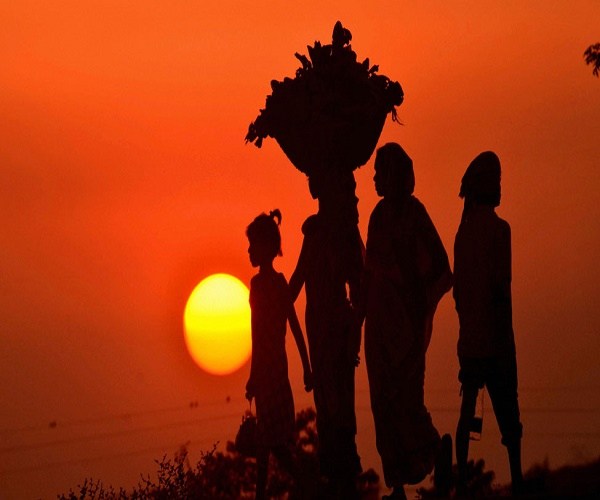When first met 61-year-old Nachammal in April, 2017, sitting on the pavement at Jantar Mantar. She claimed she had been threatened by bank officials when she had been unable to pay off her Rs 3 lakh loan from a nationalised bank. ‘Why do you eat? Why do you wear clothes? Sell them. Sell your daughter but pay off the loan’ is what she heard from them.
The interest and fine brought the overdue amount to Rs 7 lakh. She even sold her mangalsutra, but it was a pittance compared to the loan amount she was supposed to pay. “Bank officials threatened to grab my land,” she told me.
Then there was 54-year-old Selvaraj. Scanty rainfall had turned his land barren. He felt that a loan of Rs 7 lakh from a nationalized bank in Trichy would bail him out of the situation, but to no avail. In 2015, he mortgaged his gold jewellery, but when he failed to return the amount, his jewellery was sold. “I am left with only two cows at home. Selling milk is the only source of income for us,” he said.
In the last two years, there have been numerous farmer rallies and sit-ins at Jantar Mantar. Amidst the 2019 Lok Sabha elections, political parties seem to be in a race to promise the most schemes and sops for farmers, I wonder what Nachammal and Selvaraj would be thinking. Can their lives get any better, while they are staring at unpredictable weather patterns, illegal cultivation of banned genetically-modified crops and browbeating multinational corporations?
It would appear that political parties have avoided taking a stand over certain recent developments that have shook farming communities across India.
Bt Brinjal creeps in
Take for instance the alleged illegal cultivation of Bt-Brinjal in Haryana. The banned, genetically-modified crop has crept surreptitiously into our food chain, while the authorities were napping. In 2010, the UPA government had declared a moratorium on the cultivation of the crop citing the toxic effects of Bt-Brinjal on human gastrointestinal tract.
Haryana, a state with sizeable farming community, goes to vote on May 12 in the sixth phase of the Lok Sabha elections. The illegal cultivation of Bt-Brinjal should have become an election issue. The state and centre governments should have taken cognisance over the violations. But disappointingly, no political parties has taken up the issue.
Bt-Brinjal developers claim that the crops reduce the use of chemical pesticides in the farms. But concern arises whenglaring examples of GM crops causing irreparable damage to the ecosystem arise. Bt-Cotton, for instance, a non-edible commercial crop deteriorates soil health and causes a number of allergies. In light of this example, can we be sure that Bt Brinjal is completely safe? Moreover, why do we even need Bt-Brinjal whtn India has more than 2,500 varieties of brinjal?
PepsiCo’s blunder
A few hundred kilometers from Haryana, in Sabarkantha district of Gujarat, US giant PepsiCo sued four farmers accusing them of infringing PepsiCo’s Intellectual Property Rights (IPR). The farmers dared to cultivate FL 2027 and FC5, Pepsico’s patented variety of potato used for manufacturing Lays potato chips.
This is not the first time that PepsiCo has sued farmers. Last year, five farmers were slapped with an IPR infringement case asking for a compensation of Rs 20 lakh from each of them. This time, the compensation amount has gone up to Rs 1.05 crore, an astronomical amount.
The company’s action has invited a huge backlash from farmer groups. Farmers are free to grow, plant, exchange and sell patent-protected crops, including seeds under the Protection of Plant Varieties and Farmer’s Rights Act, 2001.
Realising its mistake, PepsiCo reportedly wants to settle the case now by asking farmers to either join their collaborative potato farming programme or sign an agreement that allows them to grow any variety of potato except FL 2017 and FC5.
Gujarat’s Deputy Chief Minister Nitin Patel promised that he would back the farmers in this case. But will his actions be enough to ensure seed sovereignty for farmers and keep in check the corporate monopoly in the agricultural sector?
Elections are underway, with three more phases to go. And it will be the duty of the new central and state governments to make sure that the rights of local communities and indigenous groups are not exploited in the name of development.
Political parties must up the ante to woo farmers, their biggest vote bank. Both the major political parties, the Indian National Congress (INC) and Bhartiya Janta Party (BJP), have their plans in place. BJP talks about expanding its Pradhanmantri KISAN Samman Nidhi Yojna to medium and big farmers and Congress promises to propose a separate budget for farmers. BJP says it will inject Rs 25 lakh crore to the agriculture sector to boost productivity, while Congress proposes a National Commission on Agricultural Development and Planning. But to win over the farming communities, political parties must ensure that they will safeguard their rights over the farms and the produce.
Elephant in the room
Marred by debts, the farmer in India will not be wooed by empty promises. And let’s not forget the elephant in the room — climate change, the issue that political parties shy away from. In an agrarian economy like India, which is highly dependent on monsoons for irrigation, we simply cannot afford to overlook climate change. In the next ten years, India will witness frequent bouts of heat waves, droughts and floods. And who bears the brunt? The Indian farmer.
Several environmental organisations have written to various national and regional political parties to address climate change and other environmental issues. Most parties accommodated policies on clean air, water, renewables and green cover. But environmental issues still haven’t found space in the political discussions, despite the fact that these issues directly concern farmers. #KhabarLive







